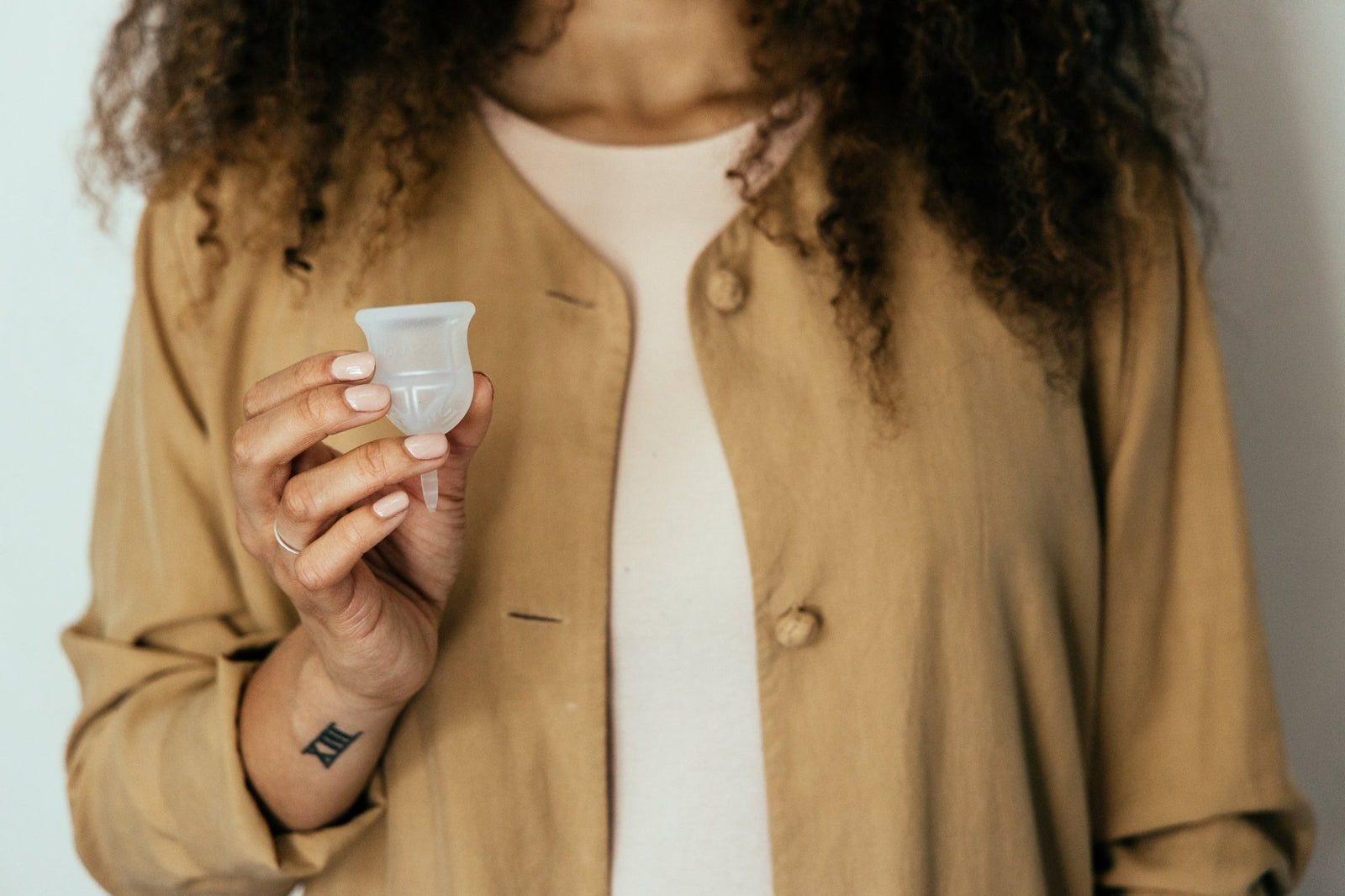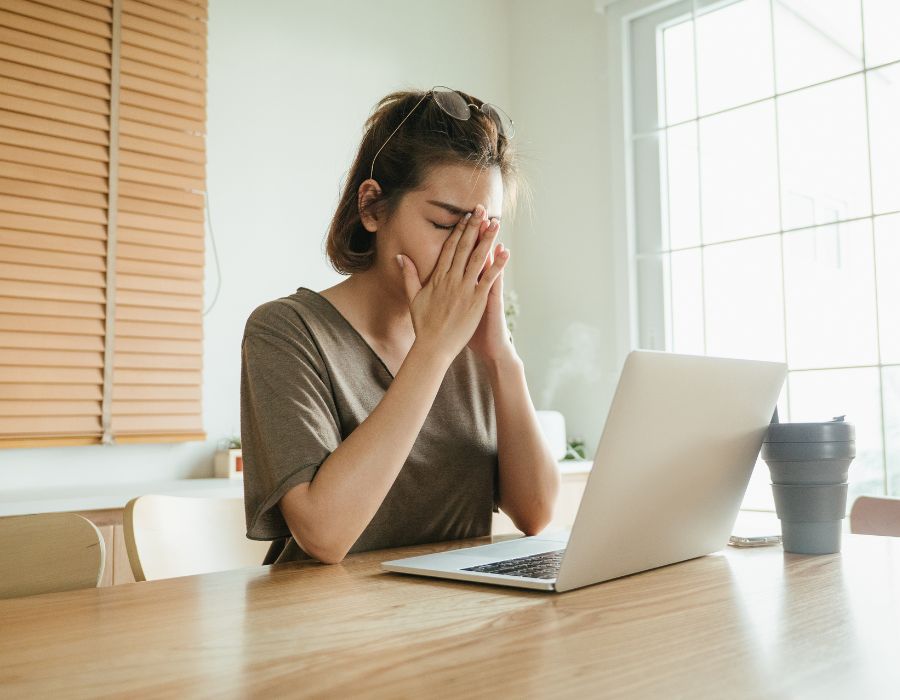
We recently interviewed Geena Pietromonaco to learn about her experience with vaginismus, tampons, painful sex, and a hymenectomy. Before we dive into her story, below are some of the basics about vaginismus for those who may be learning about it for the first time. If you’re not new to vaginismus and want to skip ahead to her dark-humored, ridiculously relatable, and vagina-wrenching story, scroll down to our Q+A with Geena.
What is vaginismus?
Vaginismus is a pelvic floor condition that occurs when the vaginal muscles tense, squeeze or spasm involuntarily when something enters it – such as a tampon, contraceptive, sex toy, finger, or penis. This can make vaginal exams or having sex extremely painful (dyspareunia) or even impossible.
Someone with vaginismus is unable to control it, and it can range from being mildly uncomfortable for some to extremely painful for others.
There are two main types:
- Primary Vaginismus - when one has pain every time something enters their vagina (life-long vaginismus)
- Secondary Vaginismus - where one has been able to have penetrative sex without pain before but it later becomes painful or impossible
How common is vaginismus?
It is fairly common, and yet, the condition is likely to be undiagnosed due to the stigma and fear one may feel.
Experts aren’t really sure how many people struggle with vaginismus, due to the embarrassment that many have around being able to talk about it.
What causes vaginismus?
Vaginismus can occur at any stage of life, even if it didn’t happen before, but is often first noticeable during teen years to early adulthood when one might try using a tampon or menstrual cup, explore with their first sexual partner, or go in for their annual vaginal exam. It can also occur later in life after years of having comfortable sex. Doctors aren’t entirely sure why vaginismus happens, but some things thought to influence it are:
- Anxiety disorders
- Having a bad first sexual experience involving abuse, rape, or trauma
- Traumatic childbirth
- An unpleasant medical examination
- False beliefs about sex, such as it being shameful or wrong
How do I know if I have vaginismus?
If you find it a struggle to insert a tampon or menstrual cup into your vagina or feel intense pain during intercourse, you probably need to see a doctor to determine whether you have vaginismus.
Some key symptoms to look out for are the following:
- Discomfort or pain during vaginal penetration (with a tampon, menstrual cup or disc, finger, etc.)
- Being unable to have sex or get a pelvic exam done due to pain or vaginal muscles spasms
- Painful sex
- Loss of sexual desire
It’s not all bad news though – it is easy to diagnose and treatable!
Treatment options for Vaginismus (can it be cured? What type of doctor should you see for this?)
When treating vaginismus your doctor may decide to target the anxiety that contributes to it or exercises to reduce the muscle reflex that causes your pelvic floor to tense up.
No need to worry – there are quite a few options to choose from. Vaginismus is not only treatable, it can even be cured.
Some options available:
- Topical therapy
- Pelvic floor physical therapy
- Vaginal dilator therapy
- Cognitive behavioral therapy
- Sex therapy
Not sure what doctor you should go to? A gynecologist, pelvic floor therapist, or sex therapist can help guide treatment options that will be best for you.
Can you have sex or a baby if you have vaginismus?
Some with primary vaginismus have been able to conceive without having penetrative sex. This is possible when ejaculation happens near the vaginal opening, allowing the person to get pregnant without penetration.
As for delivery of the baby, it is possible, but choose your provider carefully as having a compassionate medical staff can make all of the difference in your experience. Your doctor may even recommend less frequent vaginal examinations leading up to the birth of the baby. Unresolved vaginismus may present unique challenges during childbirth, but will not prevent you from having a baby.
What is a hymenectomy?
Your hymen is a piece of tissue covering a part of your vaginal opening. It is totally normal, and most are either born with it or develop it during early childhood. A hymenectomy is a procedure that is done to remove extra tissue from the hymen that partly or completely covers a vaginal opening.
To ensure comfortable menstruation, an opening needs to be created in the hymen. In most cases, an opening will naturally develop in the hymen through one of several normal activities in a young person's life (e.g. inserting a tampon, working out, having sex).

Yet, some people might have a hymen that is not easily ‘broken’ or ‘opened’ – that’s when a hymenectomy procedure might be performed to help relieve discomfort.
Interview with Geena Pietromonaco on Vaginismus, Tampons, Painful Sex, and a Hymenectomy
Hey Geena, tell us a little bit about yourself.
Hi there! I’m Geena Pietromonaco. I’m 29, live in Seattle, WA, and I’m in hot pursuit of a career in film and television as an actor and writer. I love to garden, dance, and rollerblade – and I really love to eat.
This is fun – it feels like speed dating!
When did you first realize what you were experiencing was different than others? Were their early signs of having vaginismus?
I have a pretty distinct memory of being in high school – probably 15 or 16 years old – and I was sitting in the bathroom at my house. The voices of my friends were just outside of the bathroom door trying to coach me through the process of putting in a tampon.
We were going to the beach – it’s not like I was gonna wear pants to the beach, so I had to figure this cotton plug thing out. “It’s all about the angle,” they’d say. “Aim for your lower back!” I’d try and try, thinking I was surely just doing it wrong. That was one of the first moments I felt, maybe something isn’t right here! It shouldn’t be THIS hard. It shouldn’t feel like I’m hitting bone when I’m trying to put in a tampon.

Sweet 18-year-old Geens diagnosed with vaginismus, trying to be all sexy in her high school's production of "The Wedding Singer." Nice try, ya virgin, you can't even use a tampon yet.
How did it make you feel initially?
I was, what one might call, a ‘prude’ in high school. On top of that, my struggles mostly came around menstrual care – which is isolating in its own way. I wasn’t able to participate in certain activities, and I felt ‘unusual’ about my body, worrying about wearing leotards in school musicals with a bulky pad on – ya know, that sorta stuff.
Perhaps my ‘prude-ness’ was influenced by my general genital avoidance – not even wanting to ‘go there’ with others because I hadn’t really ‘gone there’ myself. As I got older and started to explore intimacy more, it became exponentially more frustrating. My doctor told me I had vaginismus just before I graduated from high school, so I started my college years with that lingering on my mind. I found myself having awkward conversations of “why it actually doesn’t work when you try to finger me,” or uncomfortably squirming my way out of situations that may have otherwise been pleasurable. I would often avoid certain situations altogether, wishing I could “go all the way” with certain partners and furious that I wasn’t able to. It created this pretty strong resentment in me.
I suppose I would have carried on like that for – I don’t know – maybe forever? I found myself not really doing the physical therapy for vaginimus because using the dilators felt like utter hell, and I avoided getting another opinion from a doctor because they would probably tell me the same thing. I basically had resigned to a life without penetration… UNTIL a very serendipitious thing happened.
I woke up with a horrible pain in my side one morning that sent me to the emergency room. After testing, ultrasounds, barfing, an MRI, and an it-might-be-cancer freakout, it became clear that I had some masses on my ovaries that needed to be removed.

Thanks to a surprise double ovarian cyst removal, 21-year-old Geena learns she doesn't have vaginismus! Her crotch problem (a partially imperforate hymen) can be remedied with a simple surgery!
Before going in for the procedure, I asked the surgeon, “Hey, while you’re down there, would you mind checking to see if I have vaginismus?”
Lo and behold, this double ovarian dermoid cyst removal uncovered the real culprit to my penetration problem: I didn’t have vaginismus after all, I had a partially imperforate hymen that could be easily remedied through outpatient hymenectomy surgery! It only took a LITERAL medical emergency for me to ask again.
How did your diagnosis impact your love and sex life?
I wish I could say that post-hymenectomy, I was feelin’ great and having all sorts of penetrative sex right away. But I guess all of those years of pain and frustration left a mark. It took me years to finally get to a place to try it and even longer to really enjoy it.

A few months after the cysts, Geena gets a hymenectomy, effectively fixing her penetration problem. Her college roommates throw her the "Cheers to new Vag-innings" party of her dreams.
As difficult as this whole situation was, it was also full of genuinely hilarious moments that made it so much easier. Like when my nurse friends tried to put a tampon in for me. Or when my roommates threw me a “Grand Opening” party after my hymenectomy. Or all the times friends and family would just listen to me patiently. As corny as it sounds, talking about this stuff with the right people will always make it easier.
What are you doing to create awareness about vaginismus and other stigmatized body conditions?
I’m sharing my story in hopes that it might help someone else struggling with vaginismus or another stigmatized body condition to know they aren’t alone.
In fact, I’m making a whole short film about it!
Impenetrable is a short film inspired by my experience with sex organ issues – my hope is to eventually create a TV series that will capture the loneliness, confusion, and silliness of problems like these and hopefully empower folks to talk more openly. There are all sorts of quotes about shame and how it can only survive in the darkness. I hope a short film, like Impenetrable, or reading this story will help bring any shame you might have into the light, too!
How can others continue to follow your journey or donate to your work?
You can help bring the production of this short film by Geena to life by donating to her live campaign through October 12, 2022 at this link: https://seedandspark.com/fund/impenetrable#story You can also follow the film on instagram at @impenetrabletheshortfilm or follow Geena @geerose21
Have you had a similar experience to Geena or was this your first time learning about vaginismus? Let us know in the comments below.

Maria Laura Cordoba is a lifelong learner, avid traveler, and tea lover. While she was born in Venezuela, she’s lived on four continents and speaks Spanish, French, and English––currently residing in South Korea. Her varied cultural experiences have broadened her worldview and shaped the global citizen she is today, fueling her desire for collective change to make the earth an equal place for everyone independent of gender, race, or ethnicity. She is a passionate animal rights activist and enjoys exploring Korean food markets, vegan cuisine, and getting lost in nature with her dog.




Judy Reynolds
September 16, 2025
Never trust men because they are all the same, i really got guided by hackerspytech () gmail (dot) com,, because my husband kept acting somehow which i knew shit has been happening at my back but he refused to open up to me but thank God for hackerspytech () gmail (dot) com. With this hacker i gained access to my husband phone after going through all deleted conversations, WhatsApp, text messages and many more i found out that he and my best friend has been making arrangement to get married right at my back. it was not an easy one to leave my husband like that but for the fact i got evidence that he has been cheating on me i have to. would have really shared my testimony about this hacker 2 months ago but i have been down after going through my husband phone i had to take a break and now am back and better all thanks to hackerspytech (@) gmail (dot) com.